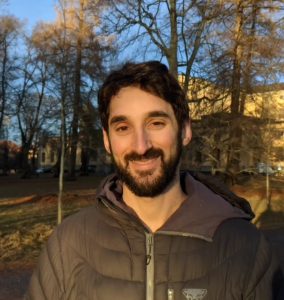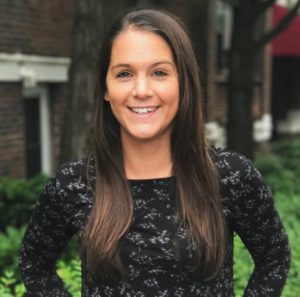Speakers
March 9th, 2023 (Thursday)
Speakers: Yan Bai (World Bank) & Breanne Langlois (Tufts)
Dr. Yan Bai is currently an Assistant Professor in the School of Public Affairs at Zhejiang University and a consultant to the Development Data Group of the World Bank. Specializing in food and nutrition security and food price research, he is a core member of the Food Prices for Nutrition project, a partnership between the World Bank, Tufts University, and IFPRI. Dr. Bai holds a Ph.D. degree from Tufts’ Friedman School of Nutrition. Before joining the Friedman School, he earned a master's degree in international business (MIB) at Tufts’ Fletcher School, focusing on international finance and global health studies. Prior to his graduate education, Yan worked as an investment analyst at IFC and the Rothschild Group, where he acquired industry experience in the healthcare, life sciences, and agriculture sectors. Yan also holds a master's degree in economics from Tufts and bachelor's degrees in chemistry and economics from Peking University in China.
Bree is a current doctoral candidate in Nutrition Epidemiology and Data Science at Tufts University. Her research focuses on how recurring natural disasters from climate change are shaping food security and nutrition over time. She specializes in spatial and epidemiological data linkages, dynamic mapping, and the usability of climate and disaster data for nutrition and public health research. She has had over 10 years of research and analytic experience including work on large-scale field trials in Burkina Faso and Sierra Leone as part of the Food Aid Quality Review project. She is a former Tufts Institute of the Environment fellow and a current NIFA fellow focusing on addressing data gaps to study recurring flooding and household food access in Indonesia.
Moderator: Yutong Chen (Tufts)
Yutong Chen is a first-year PhD student at Tufts University Friedman School of Nutrition Science and Policy, concentrating in Nutrition Epidemiology and Data Science. Her research topic focuses on dietary patterns and inadequate nutrition consumption on a global scale. She graduated from Tufts with a dual master's degree in Nutrition (concentration in Nutrition Intervention, Communication, and Behavior Change) and Public Health (Epidemiology and Biostatistics). She joined the Global Nutrition and Health Altas (GNHA) and has worked as a data analyst since 2021 summer of 2021. She is also dedicated to working on COVID-19 booster-related topics with a few Tufts Public Health department faculty members.
Speakers: Anne-Marie Bonneau (Zero-Waste Chef) & Kate Leadbeater (FlashFoods)
Cookbook author, blogger, fermenter and sourdough baker Anne-Marie Bonneau has lived plastic-free since 2011. Through social media, her blog and her book, The Zero-Waste Chef: Plant-Forward Recipes and Tips for a Sustainable Kitchen and Planet, Anne-Marie shows others how reducing their trash not only benefits the planet but also satisfies their taste buds, improves their well-being and boosts their bank accounts. A Canadian transplant, she has two grown daughters and lives in the San Francisco Bay Area with her husband and sourdough starter, Eleanor. Instagram, Facebook and Twitter: @zerowastechef
Kate leads marketing and customer experience at Flashfood, an app that seeks to end retail food waste by making near-dated groceries an affordable source of healthy food for families. Flashfood is available in more than 1,600 grocery stores across North America and has diverted more than 65 million pounds of food from landfill since it was launched in 2018. Prior to pursuing her passions for food and sustainability at Flashfood, Kate spent eight years at a global advertising agency, working with clients from a variety of sectors including CPG and tourism. She has studied communications and media at the University of Toronto and Montreal’s Concordia University and was a guest lecturer at the University of Alberta MBA Program. When Kate’s not developing marketing strategies, you’ll find her gardening, making messes in the kitchen with her 6-year-old, and advocating for the changes we need to limit global warming.
Moderator: Rob Guillemin
Robert Guillemin has worked in the field of environmental sustainability for over 35 years, focusing on ways to promote lasting change with a combination of market-based solutions, new technologies, improved management systems, and strategic partnerships. Since 2016, he has been a Professor of Practice, teaching courses on sustainability and food businesses at Tufts’ Friedman School of Nutrition and the Urban and Environmental Policy and Planning Department. His courses examine sustainability activities along the food supply chain, from farm gate to cash register, including business efforts to divert food from landfills through source reduction, donation, upcycling, and composting. Since 2001, he has worked at the Environmental Protection Agency’s New England Office where he oversees sustainable materials management and pollution prevention grant projects run by state agencies and non-profit organizations. In the past decade, much of this work has involved food and beverage manufacturers, food retailers, food service providers, and institutional food management companies.
Speaker: Dariush Mozaffarian (Tufts)
Dariush Mozaffarian is a cardiologist, Special Advisor to the Provost, Dean for Policy, and Jean Mayer Professor at the Tufts Friedman School of Nutrition Science and Policy; and Professor of Medicine at Tufts School of Medicine.
Moderator: Laura Lau Castor (Tufts)
Laura Lara-Castor is a doctoral candidate in Nutrition Epidemiology & Data Science at the Friedman School of Nutrition Science and Policy at Tufts University. Her current doctoral research focuses on characterizing the sugar-sweetened beverages (SSBs) intake globally, its association with cardiometabolic disease, and the influence of SSBs taxes on intake, under the mentorship of Dr. Renata Micha and Dr. Dariush Mozaffarian. In 2021, Laura was awarded with a fellowship from the American Heart Association through December 2023 for the completion of her thesis research. In addition, Laura has collaborated as teaching assistant for the Principles of Epidemiology course since Fall 2020 to date, and for the Grant Writing course during the Summer of 2022. Before starting her doctoral studies, Laura completed a BS in Nutritional Sciences, a MS in Nutrition and Metabolism, and worked as a junior researcher at the National Institute of Public Health in Mexico in projects aimed at decreasing the prevalence of non-communicable chronic diseases among the Mexican population.
Description: Life cycle assessment (LCA) is a methodology for assessing environmental impacts associated with the life cycle of a product, process, or service. LCA can play a key role in transitioning to a net zero emissions system. Participants in this workshop get a general idea of the importance of the LCA, and learn to use and apply professional software tools and databases that address environmental impacts. The hybrid application of LCA with AI-based algorithms will be also discussed in the workshop. The LCA analysis will be performed on a case study on a cultivated meat product using Simapro software.
Speaker: Amin Nikkhah (Tufts)
Amin Nikkhah is a Postdoctoral Fellow in the Division of Agriculture, Food, and Environment at the Friedman School of Nutrition Science and Policy at Tufts University, Boston, United States. He has experience working on sustainability related projects on three different continents: Europe (Belgium), Asia (South Korea), and North America (the USA). He has published more than 40 scientific papers in some high impact journals, such as Renewable and Sustainable Energy Reviews (Impact factor=17), Journal of Cleaner Production (Impact factor=11), and Science of the Total Environment (Impact factor=11). Amin is also the guest editor of special issues in the Journal of Life Cycle Assessment (Springer; Impact Factor: 4) and sustainability (MDPI; Impact Factor: 3). His research has been cited over 800 times and has an h-index of 18 and i10-index of 24. Cumulative impact factor of Amin's publications stands at over 100. His current research interests are development of life cycle assessment (LCA) methodology, and circular economy in the food systems.
Moderator: Isabella (Bella) Young
Isabella Young is a first-year Master's candidate in the Food and Nutrition Policy and Programs division at the Friedman School of Nutrition and Science Policy. Previously, she served on the performance nutrition staff at Texas A&M for four years, was a City Health Promoter at International Rescue Committee, and currently serves as an International Development Intern at the Network of Engaged International Donors in Boston, Massachusetts. Her academic focus at Tufts centers around zero hunger and humanitarian aid delivery in emergencies. After Tufts, Isabella will pursue her passion for nutrition, focusing on mothers and children in emerging countries.
Description: Is meat the problem or the solution? Among the things we eat, animal sourced foods have the greatest carbon footprints, use the most land and are the largest contributors to water pollution. At the same time, meat can supply important nutrients to a balanced diet, is crucial to the livelihoods and cultures of billions of people, and can play a central role in the ecology of farming.
The panel will consist of three speakers who variously represent and advocate for: 1) an intensive livestock future that that can efficiently feed a growing population using the least amount of resources; 2) a regenerative animal agriculture future – growing less meat on more land to mitigate some of the negative environmental impacts of livestock production; and 3) a plant-based/alt-meat future – one in which we don’t raise animals or eat them.
Speakers: Rob Percival (Author), Sigrid Agenäs
Rob Percival is a writer, campaigner and food policy expert. He works as Head of Food Policy for the Soil Association, advocating for sustainable diets and agroecological farming. The Meat Paradox, his first book, was published in 2022.
Moderator: Matthew Kessler (TABLE)
Matthew Kessler is a project coordinator at TABLE and sits in Uppsala at the Swedish University of Agricultural Sciences. He is a podcast creator, co-host and editor of ‘Feed: a food systems podcast’ that is in conversation with people who have different ideas about how to transform the future food system. And he is the project leader and podcast host of the upcoming ‘Meat the four Futures’ podcast (Spring 2023). Matthew spent five years of working on and managing farms before going back to school for a BSc in Environmental Sciences with concentrations in forestry and sustainable agriculture from Warren Wilson College and a MSc in Agroecology from Norwegian University of Life Sciences.
Description: Industrial animal agriculture is linked to a range of external costs that include climate change, biodiversity loss, antibiotic resistance, and pandemic risk. But meat production is expected to grow by at least 70 percent globally, mostly in developing countries. One critical solution to this reality that analogizes to renewable energy and electrification of transport (i.e., a global and market-based solution) is to make meat better - to create the exact same meat experience from plants or to cultivate actual animal meat directly from cells.
Speaker: Bruce Friedrich (The Good Food Institute)
Bruce is founder & CEO of the Good Food Institute, a global nonprofit organization that works on alternative protein policy, science, and corporate engagement. Learn more at gfi.org.
Moderator: Tim Griffin (Tufts)
Speaker: Jennifer Ballew (Cambridge Sustainable Labs)
Jennifer Ballew works as a Sustainability Project Planner for the Climate Team at the City of Cambridge, Massachusetts, primarily focusing on a local energy use and emissions reduction ordinance. Prior to transitioning to a role in government climate action, she worked for 15+ years as a scientist-turned-sustainability professional, leveraging her experience in biotech to work in impactful, ESG oriented roles at MIT and at My Green Lab. She founded a local working group in 2018 called Cambridge Sustainable Labs, which has 150+ members from over 30 local organizations, and meets regularly to discuss topics and strategies related to resource conservation in laboratories.
Moderator: Mélanie Guirette
Mélanie, MS, RD is a doctoral candidate in NEDS program and received her MS in BMN in 2020. She completed her dietetic internship at the Brigham and Women's Hospital in 2021.
Selected Students:
- Natalie Somers (Tufts): Social well-being and marine ecosystem decline in the global fishing industry – what it means for food security and the sustainability of our oceans
- Sophia Weiss (Tufts): Farmer engagement and perspectives on the diversification of agricultural land to increase production of plant-based proteins in the United States
- Nidhi Joshi (GBPUAT): Exploring dimensions of sustainability in Indian dietary patterns
- Mrignyani Sehgal (UIUC): Links between Household Agricultural Production Diversity, Food Price Volatility and Household Food Security-- Evidence from Malawi
- Jean Pierre Enriquez(LSU): Food dynamics on a college food pantry among Latin-American doctoral students: a qualitative study
- Aishwarya Venkat (Tufts): Extreme Weather and Nutrition: A Visual Summary of the Field
Moderator: Bree Langlois (Tufts)
Bree is a current doctoral candidate in Nutrition Epidemiology and Data Science at Tufts University. Her research focuses on how recurring natural disasters from climate change are shaping food security and nutrition over time. She specializes in spatial and epidemiological data linkages, dynamic mapping, and the usability of climate and disaster data for nutrition and public health research. She has had over 10 years of research and analytic experience including work on large-scale field trials in Burkina Faso and Sierra Leone as part of the Food Aid Quality Review project. She is a former Tufts Institute of the Environment fellow and a current NIFA fellow focusing on addressing data gaps to study recurring flooding and household food access in Indonesia.
Speakers: Elena Martinez, Rachel Gilbert, Leah Costlow, Jessica Wallingford, Aishwarya Venkat, & William Masters (Tufts)
Title: Retail prices for sustainable, healthy diets: are foods with lower environmental impacts and healthier nutritional profiles also more expensive?
Description: Analyses of agricultural and food policy often assume, either implicitly or explicitly, that more environmentally sustainable and healthier diets would be more expensive for consumers. This study provides the first global test of how market prices relate to environmental impacts and nutritional value of food items within and between food groups. We combine food item availability and retail prices for widely consumed foods from around the world from the International Comparison Program, covering 177 countries in 2011 and 2017; estimates of greenhouse gas emissions, water use, and other environmental impacts from published literature; and estimates of nutritional quality using established metrics. We show that food items with smaller environmental impacts within each food group tend to have lower market prices, while the relationship between price and nutritional value varies by food group. Accounting for differences in environmental harms, health impacts, and cost by type of food can help guide policy interventions towards healthier and more environmentally sustainable options for all.
Speaker: Elena Martinez is a PhD Candidate at the Friedman School of Nutrition Science and Policy at Tufts University. Her research focuses on connections between food systems, nutrition, and the environment. Elena is currently working with Dr. William Masters on the Innovative Methods and Metrics for Nutrition Actions (IMMANA) project and the Food Prices for Nutrition project. Before starting her doctorate, Elena worked as a research analyst for the CGIAR Research Program on Agriculture for Nutrition and Health (A4NH) at the International Food Policy Research Institute (IFPRI) in Washington, DC, where she focused on connections between agriculture, nutrition, and gender and developing measures of women's empowerment. She also worked as a senior research analyst at the Center for Disease Dynamics, Economics & Policy (CDDEP) in Washington, DC, where she focused on antimicrobial resistance. Elena hold a Master of Science (MS) in agriculture, food, and the environment from the Friedman School of Nutrition Science and Policy, a Master of Public Health (MPH) in epidemiology and biostatistics from the Tufts University School of Medicine, and a Bachelor of Arts (AB) in ecology and evolutionary biology from Princeton University.
Title: Introduction to Food Prices for Nutrition
Description: Since 2015, a series of projects have developed new ways of measuring physical and economic access to healthy diets for each population around the world. These metrics, known by their FAO acronym as the Cost and Affordability of Healthy Diets (CoAHD), use retail prices matched to food composition and nutritional requirements to identify the least expensive combinations of locally available foods needed for health in every country at any given time. These data reveal whether nutritionally inadequate diets are caused by high prices and low incomes leading to unaffordability, or by displacement of healthy by unhealthy foods for other reasons such as taste, time and aspirations. National average CoAHD estimates by year are now published by the FAO and the World Bank for international comparison and monitoring of global food and nutrition security, while variation within countries is being analyzed to guide national policies. This presentation introduces the CoAHD metrics and their use around the world.
Speaker: Rachel is a Ph.D. Candidate in Food and Nutrition Policy and Programs at the Friedman School of Nutrition Science and Policy at Tufts University, where she works with Dr. William Masters on the Food Prices for Nutrition project. Her research focuses on the intersection of agriculture, food, and nutrition, using economic analysis to understand food choices and improve access to healthy diets.
Title: Food import policies and the cost of healthy diets
Description: Trade policies can play a key role in economic development and poverty reduction, with significant impacts on food systems and food security. Access to food with different nutritional values is one of the channels through which trade policy affects nutritional outcomes in a country. This study focuses on two indicators of trade policy – import tariffs and non-tariff measures – tracing their importance for consumer prices of least-cost items in proportions needed for an active and healthy life. We quantify the contribution of import barriers to commodity and retail food prices and the resulting cost of a healthy diet across 144 economies, with a special focus on Africa.
Speaker: Leah is a doctoral candidate in FANPP program and received her MS in AFE in 2021.
Title: What do least-cost nutrient adequate diets reveal about food systems?
Description: George Stigler first described the least-cost diet problem and a heuristics-based solution in his 1945 article, ‘The Cost of Subsistence”. Since then, optimization models have been developed and employed to calculate exact quantities of foods needed to meet sets of dietary constraints at lowest total cost. In this talk, we introduce a visual depiction of linear optimization, designed around the ‘three sisters’ (corn, beans, and squash). This graphical example of a simple least-cost diet can be used as a basis to build intuition for more complex multidimensional optimization models, and demonstrates the role of dietary diversity in meeting nutrient and energy needs.
Speaker: Jessica Wallingford is a PhD Candidate and part of the Food Prices for Nutrition Lab at the Tufts University Friedman School. She have a MSc in Neuroscience from McMaster University (ON, Canada) and a MSc in Agriculture, Food, and Environment from Tufts University (MA, USA).
Title: Supply Chain Resilience to Extreme Weather: Evidence from Early Warning Systems
Description: Anthropogenic climate change has accelerated the frequency and variability of extreme weather events such as heatwaves, floods, and droughts. Retail prices provide a critical indicator of supply chain resilience to these shocks, and data from politically and nutritionally sensitive areas can be extracted from early warning systems. This study utilizes a rich dataset of more than 2.6 million retail prices in over 2,500 world markets to quantity the relationship between extreme weather and retail food prices across markets and food groups. We find that supply chains are generally resilient with some exceptions for perishable food groups in urban markets. These findings can inform short-term interventions to mitigate extreme weather impacts and protect diets.
Speaker: Aishwarya is a doctoral student in Agriculture, Food, and Environment at the Friedman School of Nutrition Science & Policy at Tufts University. Prior to this, she earned her MS in Environmental Engineering from Tufts University, and a BS in Biological Systems Engineering from Virginia Tech. Aishwarya specializes in spatial statistics and data science, and her dissertation research studies food system responses to extreme weather events.
Speaker and Moderator: Will Masters (Tufts)
Will Masters is a Professor of Food Economics and Policy in the Friedman School of Nutrition at Tufts University, where he leads the Food Prices for Nutrition project that computes the cost and affordability of healthy diets, and the IMMANA Fellowships program among other initiatives. From 2011 to 2014 he served as chair of the Friedman School’s Department of Food and Nutrition Policy, and before coming to Tufts was a faculty member in Agricultural Economics at Purdue University (1991-2010), and also at the University of Zimbabwe (1989-90), Harvard’s Kennedy School of Government (2000) and Columbia University (2003-04). He is the co-author of an undergraduate textbook, Economics of Agricultural Development: World Food Systems and Resource Use (Routledge, 4th ed. 2021), and former editor-in-chief of the journal Agricultural Economics (2006-2011). He was elected a Fellow of the Agricultural and Applied Economics Association (AAEA) in 2020.
Selected Students:
- Troi Reyes (UST): OPT Plus MApp: Development and Pretesting of a Mobile Application on Operation Timbang Plus – Nutrition Assessment for Under-Five Filipino Children
- Emily Sanchez (Tufts): Sources of Algorithmic Bias in Foodborne Disease Outbreak Duration Patterns using the National Outbreak Reporting System, 2009-2019
- Kiyavash Irankhah (Mashhad): The necessity of territorial approaches for designing and implementing sustainable food baskets-- a case study in Iran
- Letícia Bizari (Harvard): Minimum number of consultations required for successful clinical management of obesity
- Jiada Zhan (Emory): Dietary Index-- an R package for streamlining dietary pattern analysis in epidemiological and clinical studies
Moderator: Yi Zhao
Yi is a doctoral candidate in Nutrition Epidemiology and Data Science at Tufts University and a Data Science Specialist at Tufts Technology Service (TTS). Her Ph.D. work aims to study the effect of omega-3 fatty acids on the risk of Alzheimer's disease. Her methods focus on causal inference approaches, including Mendelian randomization, target trial emulation, and causal mediation analysis.
Description: Recent methodological advances allow researchers to use data from the National Health and Nutrition Examination Survey (NHANES) to conduct diet sustainability analyses. Data on dietary intake, health outcomes, environmental outcomes, and diet cost can now be integrated and analyzed to evaluate trade-offs between these domains. This presentation provides an overview of these methods and can be used as a resource to guide further research.
Speaker: Zach Conrad (William & Mary)
Zach Conrad is an Assistant Professor in the Department of Kinesiology and a Faculty Affiliate at the Global Research Institute at William & Mary in Williamsburg, Virginia. He is a nutritional epidemiologist and food systems scientist, and his research leverages large datasets and modeling techniques to examine the complex interactions between food choice, diet quality, environmental sustainability, and affordability. He is the author of more than 45 peer-reviewed scientific publications and he sits on the editorial board for the Journal of the Academy of Nutrition and Dietetics and Nutrition Journal. His research is currently supported by grants from the Institute for the Advancement of Food and Nutrition Science, the Commonwealth Center for Energy and the Environment, and The Jeffress Trust. Before joining William & Mary, Dr. Conrad was a Postdoctoral Scientist at USDA from 2016-2019 and a Postdoctoral Scholar at the Friedman School of Nutrition Science and Policy at Tufts University from 2015-2016. He earned his PhD in nutrition from the Friedman School, his MS in food systems from the Friedman School, his MPH in nutrition from Tufts University’s School of Medicine, and his BA in biology and anthropology from Trent University in Ontario, Canada.
Moderator: Yu-Hsiang Chiu
Yu-Hsiang Chiu is a Master of Science student majoring in the Nutrition Interventions, Communication, and Behavior Change program at the Friedman School of Nutrition Science and Policy, Tufts University. To become a registered dietitian, he also enrolled in the Didactic Program in Dietetics at Simmons University and will start his dietetic internship at Massachusetts General Hospital in September 2023. Currently, he is a project manager of a systematic review project about sugar intake and diet quality. Working as a research assistant at Tufts, he assisted in data analysis about CKD patients' lab values from the Beth Israel Deaconess Medical Center. He also work as a teaching assistant for statistics and regression courses at the Friedman School.
Speaker: Beatrice Rogers (Tufts)
Dr. Rogers is an economist whose research focuses on economic determinants of household food consumption, including price policy and food aid. Her current research focuses on how food assistance programs can be designed so that their benefits can be made sustainable after the programs have closed and resources are withdrawn. She has studied the effectiveness and cost-effectiveness of alternative supplementary foods for the treatment and prevention of moderate acute malnutrition in children. She works primarily in low-income countries and worked in Sub-Saharan Africa, South Asia, and Latin America. She is a leader in the development of interdisciplinary graduate education in food and nutrition and has conducted funded research on appropriate graduate training for global nutrition and food policy professionals. Dr. Rogers received her PhD from the Florence Heller School for Advanced Studies in Social Welfare Policy at Brandeis University. She received the Friedman School’s Distinguished Faculty Award in 2008 and the Dannon Mentorship Award from the American Society for Nutrition in 2014, both honoring her mentorship of doctoral students. She is a Fellow of the American Society for Nutrition and received the ASN Kellogg Prize for International Nutrition Research in 2017.
Moderator: Danielle Krobath (Tufts)
Danielle Krobath is a postdoctoral research fellow at Tufts University with dual appointments at the Friedman School and the Eliot-Pearson Department of Child Study and Human Development. She obtained a PhD is Food and Nutrition Policies and Programs from the Friedman School in 2022 and holds an MS in Food Policy and Applied Nutrition from Tufts and a BA in Social Psychology from UMass Boston. Dr. Krobath works across the Tufts Institute for Global Obesity Research (TIGOR) and the Equity in Health, Wealth & Civic Engagement Priority Research Clusters to reveal determinants of obesity inequities. A major line of her research applies epidemiologic methods to population datasets to conceptualize and evaluate the interactions between psychosocial stressors and multiple forms of marginalization, such as structural racism, on health and nutrition outcomes across the lifespan.
Speakers: Corey Scott (Cargill) & Benny Belvin (Tufts)
Corey Scott is a Principal Nutrition Scientist with Cargill in Minneapolis, Minnesota where he leads global nutritional research on sweeteners and carbohydrates. Prior to this role, Corey was Global Nutrition Manager for Lipid Nutrition B.V., in The Netherlands focusing on clinical research involving novel lipids for early life nutrition, weight management and diabetes. He has also worked for General Mills in Golden Valley, Minnesota as a nutrition scientist in The Bell Institute of Health and Nutrition. Corey currently serves as a Steering Team member and Work Package leader for Project SWEET (a five-year EU Consortium project evaluating sweeteners), is the chair of the IAFNS low and non-caloric sweetener committee, committee chair of The North Carolina Agricultural and Life Sciences at North Carolina State University (NCALS) Technical Advisory and Finance committee chair, and an industry advisor for the UIC/FFAR Sally Rockey Fellowship. Corey holds a Doctorate degree in Food Science and Nutrition from The Ohio State University, a Master’s degree in Chemistry from North Carolina A&T State University, and a Bachelor’s degree in Chemistry from The University of North Carolina at Chapel Hill.
Benny has been working as a career development professional for nearly 20 years, including 10 years at Harvard University’s Office of Career Services where he designed innovative alumni engagement programs, led new employer outreach initiatives, and advised undergraduate and graduate students. He also served for nearly 5 years as Assistant Dean of Career Development at the Heller School for Social Policy and Management at Brandeis University. Benny is passionate about career development and relationship management and delivers numerous workshops on topics such as relationship-building, interviewing, and career exploration. Benny is currently the Director of Career Services at the Ellie Block and Family Career Services Center, for the Friedman School of Nutrition Science and Policy at Tufts University. Benny holds a Master of Science in Student Affairs Administration from the University of Wisconsin-La Crosse. He completed the Harvard University Administrative Fellowship Program and the Oxford University Executive Leadership Program. Benny has a designation as a Master Career Development Professional (Certified Master of Career Services) by the National Career Development Association (NCDA) and is a Certified Professional Career Coach through the Professional Association of Resume Writers and Career Coaches.
Speakers: Nicole Tichner Blackstone, Fang Fang Zhang, Sean Cash, Julia Matteson (Tufts)
Description: The Leading A Sustainability Transition In Nutrition Globally (LASTING) Project aims to produce evidence-based recommendations, methods, and metrics for integrated sustainability assessment of dietary patterns. Our four-pillar approach to sustainability encompasses environmental, health, economic, and social outcomes. This research roundtable will include a discussion of the LASTING framework and trade-offs between sustainability pillars, focusing on several example commodities, and dive into how to operationalize modeling these trade-offs using available data sources in the U.S.
Nicole Tichenor Blackstone is an Assistant Professor in the Division of Agriculture, Food, and Environment at the Friedman School of Nutrition Science and Policy at Tufts University. Her research focuses on developing and evaluating strategies to improve food system sustainability. To date, her research has explored the environmental and social implications of diverse production systems (e.g., grass-fed beef, cultivated meat, fruits and vegetables), human diets, and regional food systems. Currently, she leads the Leading a Sustainability Transition in Nutrition Globally (LASTING) Project, which aims to produce evidence-based recommendations, methods, and metrics for integrated sustainability assessment of dietary patterns. On LASTING, she co-leads teams focused on social metrics development and integrated modeling of dietary sustainability outcomes. Dr. Blackstone is also a founding affiliated faculty member of the Tufts University Center for Cellular Agriculture. She is PI on a project developing sustainable animal-free scaffolds for cultivated meat and Co-PI on a large, interdisciplinary project funded by the U.S. Department of Agriculture, leading the project’s environmental assessment team.
Dr. Fang Fang Zhang is the associate professor and interim chair of the Division of Nutritional Epidemiology and Data Science at the Friedman School of Nutrition Science and Policy, Tufts University. She is a nutritional epidemiologist with expertise in assessing dietary intake patterns, trends, and disparities in the population, and conducting observational studies and clinical trials to investigate the role of nutrition in chronic disease prevention and control. Dr. Zhang’s research interests also include quantifying preventable cancer burden associated with suboptimal diet and assessing the cost-effectiveness of population strategies to improve diet and reduce cancer burden and disparities in the US, and evaluating strategies to integrate food and nutrition into healthcare. She is co-leading the LASTING project focused on assessing the impact of diet on four pillars (health, environment, cost, and society). Dr. Zhang is a recipient of the Eileen O'Neil Citation for Excellence in Teaching and an inaugural recipient of the Miriam E. Nelson Tisch Faculty Fellow from Tufts University.
Dr. Cash is an economist who conducts research both internationally and domestically on food, nutrition, agriculture and the environment. He is interested in the environmental impacts in food and beverage production, including projects on crop quality and climate change, consumer interest in production attributes of tea and coffee, and invasive species management. He also focuses on how food, nutrition, and environmental policies affect food consumption and choice, with specific interest in children's nutrition and consumer interest in environmental and nutritional attributes of food. He teaches courses in statistics, agricultural and environmental economics, and consumer behavior around food. His research has been funded by the United States Department of Agriculture, the National Science Foundation, NIH, Agriculture and Agri-food Canada, and Newman's Own Foundation, among other agencies. He is currently Chief Editor of the Food Policy and Economics Section of Frontiers in Nutrition and on the editorial board of Agribusiness, and has served as the Chair of the Food Safety and Nutrition Section of the Agricultural and Applied Economics Association.
Julia Matteson is the Project Manager for the LASTING Project, IMMANA, and Food Prices for Nutrition Projects. Julia works to strategically manage and administratively support the on-going research for these projects. Prior to joining the Friedman School, Julia served as a Princeton in Latin America Research Field Assistant at Osa Conservation, working to incorporate agroecology into the restoration efforts of the Osa Peninsula in Costa Rica. She has also worked on several USAID Feed the Future funded projects focused on nutrition-sensitive agriculture and agri-business investment in Rwanda and Nigeria. She holds a BA in International Development from George Washington University and is currently an MS Candidate in the Food and Nutrition Policy and Programs (FANPP) degree at the Friedman School.
Moderator: Brooke Bell
Brooke M. Bell, Ph.D. is a Postdoctoral Research Scholar in Sustainable Food Systems Modeling at Tuft University’s Friedman School of Nutrition Science and Policy. She is broadly interested in health and food policy, food systems, climate change, and environmental justice. Her current work examines how food systems and policies can be leveraged and transformed to encourage eating behaviors that improve chronic disease outcomes and help mitigate climate change and its subsequent effects on human health. Dr. Bell received her B.A. in Mathematics and Ph.D. in Health Behavior Research (Public Health) from the University of Southern California, and she completed a Postdoctoral Fellowship at the Yale School of Public Health.
–
–
For general inquiries on the symposium program and/or registration, to provide feedback to the Student Planning Committee, or for those seeking collaboration, please contact us at tnds@tufts.edu!


































